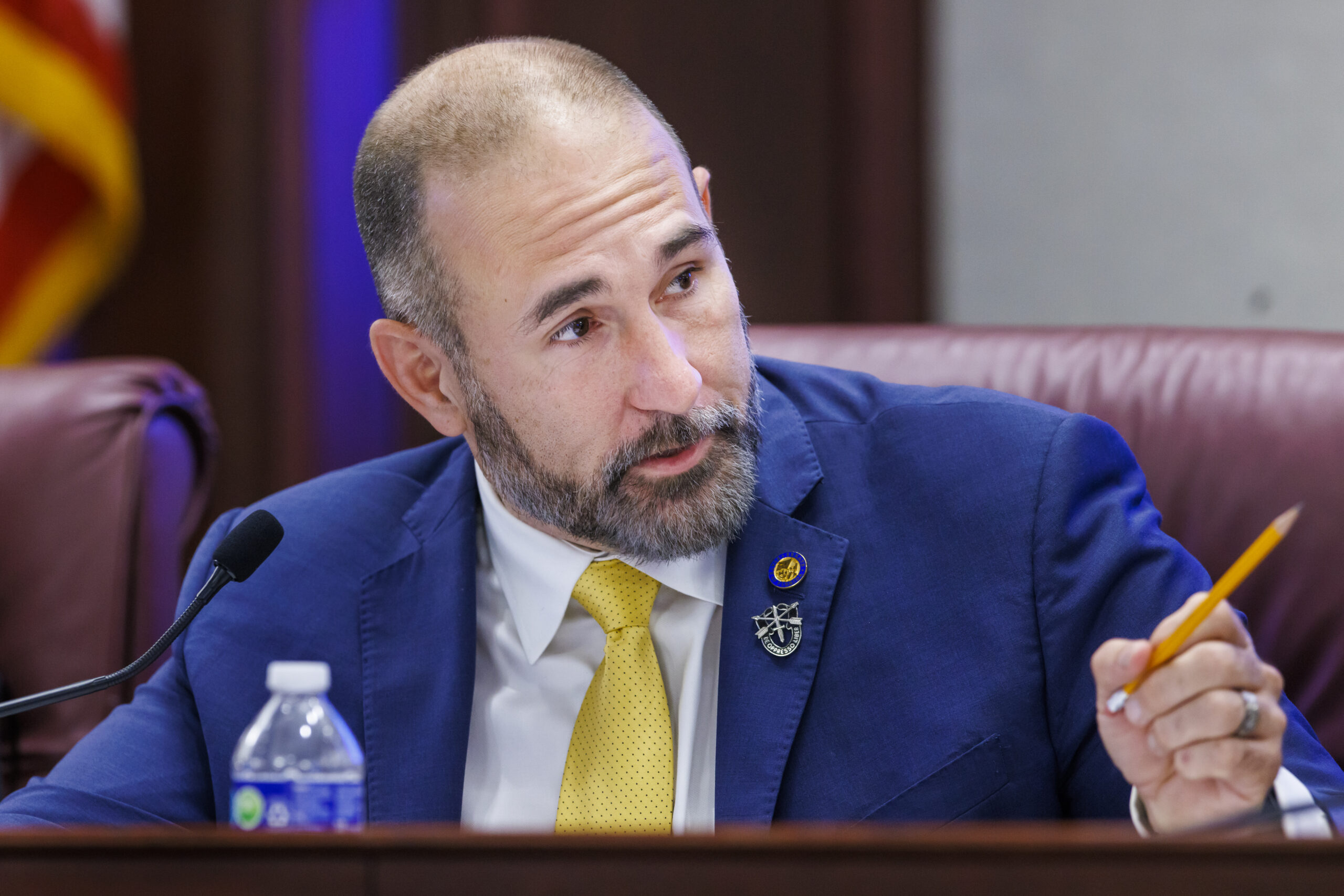State courts would be permitted to order the deportation of immigrants arrested in Iowa while in the country illegally, and local officials would be given legal immunity when assisting in immigration enforcement measures under a bill advanced in the Iowa Senate.
Senate File 2211 would create a state crime for migrants who enter or re-enter the state illegally from another country and would give Iowa law enforcement authority to arrest undocumented immigrants in the state.
It also allows state judges the option of ordering some migrants to return to their home country instead of pursuing prosecution.
Officers and state agencies would be cleared to transport undocumented migrants to ports of entry to make sure they comply. If migrants refused to comply with an order to return, or those who were ordered to be removed after being convicted of a felony, could be charged with a Class C felony and face up to 10 years in prison and a $13,660 fine.
Those whose removal followed being convicted of two or more misdemeanor drug crimes, crimes against a person, or both, could be charged with a Class D felony punishable by up to five years in prison and a $10,245 fine.
Law enforcement officers would not be allowed to arrest or detain an undocumented migrant on the grounds of a public or private school, place of worship, at a health care facility where a migrant is receiving medical treatment or those receiving a medical examination for sexual assault.
The bill was advanced on a 2-1 vote and is now eligible for consideration by the full Senate Judiciary Committee.
Democrats opposed
Immigrant rights organizations and Democrats voiced strong opposition to the bill, which would have major implications for migrants across the state and is certain to trigger lawsuits.
Read More:
Capitol Notebook: Migrant activists rally against anti-immigration bills in Iowa
They noted the bill is unconstitutional as immigration enforcement is a federal responsibility.
Federal courts, including the U.S. Supreme Court, have ruled that immigration laws can only be enforced by the federal government.
Republican lawmakers in Texas passed and Gov. Greg Abbott signed a similar measure in December that’s being challenged in court. Supporters of the Texas law have said they hope to push the issue back before a more conservative U.S. Supreme Court.
Immigrant rights advocates warned that the bill would lead to widespread racial profiling and a circumvention of protections asylum-seekers have under constitutional law and international obligations. The bill does not provide funding or a requirement to train officers on immigration law, despite authorizing them to make decisions about a person’s immigration status.
Opponents also raised concerns that parents may be separated from their children if arrested under the new state crime, and lead to migrants being sent across the southern border regardless of their legal status in the United States.
‘Instill fear’
“It’s going to instill fear, and it’s going to drive immigrant families that have been living here like mine for 30 years,” said Kenia Ceron, of Des Moines.
Immigration and refugees have helped sustain rural areas, while domestic migration has drawn people away.
In 2022, Iowa lost nearly 7,300 people to domestic migration, but gained nearly 7,300 international migrants, according to U.S. census data.
“What we have in Iowa is mixed-status families,” comprised of both U.S. citizens and undocumented immigrants, Ceron said. “What this bill will do is … drive Iowans — U.S. citizens Iowans — out of the state in fear for their families’ members that will be persecuted under this bill.”
She said the bill would also undo years worth of work by Iowa law enforcement to build trust with Iowa immigrant communities to report crimes, identify issues and establish mutual respect and communication.
“What this bill will do is make immigrants like myself more fearful of our law enforcement as they’re acting as federal agents,” Ceron said.
‘Soft invasion’
Salmon noted arrests for illegal border crossings from Mexico
reached an all-time high in December. The U.S. Border Patrol recorded 249,785 arrests on the Mexican border in December, up from 191,112 in November and up from 222,018 in December 2022, the previous all-time high.
“This is unsustainable,” she said, adding border agents have encountered individuals on the terror watchlist trying to enter the U.S. via Mexico.
Salmon said Iowa needs to defend itself, attributing increases in fentanyl seizures, drug overdose deaths and human trafficking to illegal immigration issues and what she said has been a failure of Democratic President Joe Biden administration’s to secure the border and enforce federal immigration laws.
“This is something we can do to help protect out state and protect our nation,” Salmon said.
After a weekend trip to Texas, Iowa Gov. Kim Reynolds this week said she plans to once again
send Iowa State Patrol officers and Iowa National Guard troops to aid Texas authorities with border security efforts.
‘Not their job’
Erica Johnson, executive director of the Iowa Migrant Movement for Justice, said the bill would place pressure on Iowa law enforcement and Iowa judges to interpret federal immigration law, “which is not their job.”
“It’s a nonsense law,” Johnson said, calling Salmon’s talking points on the bill “a list of grievances and laying them at the feet of immigrants.”
Tom Chapman, representing the Iowa Catholic Conference, said the group is opposed to the bill, noting much of it is clearly preempted by federal law and the U.S. Constitution.
“We don’t encourage illegal immigration,” Chapman said. “ … We support our country’s right to control its borders, and we understand the situation at the southern border cannot continue as it has,” but the issue needs to be solved at the federal level with passage of “border protection policies that are consistent with humanitarian values.”
Federal vote
U.S. Senate Republicans voted Wednesday
against advancing a bipartisan border security deal that was part of a larger emergency foreign aid package to fund the war in Ukraine, Israel and Indo-Pacific security.
Iowa's two Republican U.S. senators Chuck Grassley and Joni Ernst both voted against the deal their own party members helped negotiate.
Grassley, in a statement, said while he appreciated efforts made to negotiate border policy, “the resulting deal fails to address the border crisis caused by President Biden’s open border polices and refusal to enforce our immigration laws, which have allowed 8.8 million illegal immigrants and counting into our country.
“Gaping loopholes, poor border enforcement mechanisms and a lack of accountability measures make this legislation woefully inadequate,” Grassley continued. “Ultimately, this bill would yield massive discretionary power on border policy to President Biden and his administration. I will not vote to advance a bill that would codify ineffective policies and give President Biden more power to abuse what he has already so badly broken.”
Iowa bill
Republican state Sens. Lynn Evans, of Aurelia, and Jeff Reichman, of Montrose, voted to advance the bill, with state Sen. Janice Weiner, D-Iowa City, opposed.
Weiner said Iowa’s legal system is not set up and lacks the legal expertise to deal with immigration issues.
“I worry that what we’re heading for is the use of more Iowa taxpayer dollars to try and defend an unconstitutional law,” she said. “ … I suggest, rather than passing this bill, we call our (federal) senators and representatives and ask them to revive” the failed border security deal.
Reichman, echoing Salmon, said “something’s go to be done" absent the political clout in Congress to curb illegal border crossings.
Evans said changes are needed to the bill “to clean up some of the language” as it moves forward.
Bill would allow state courts to order undocumented immigrants deported

www.thegazette.com





